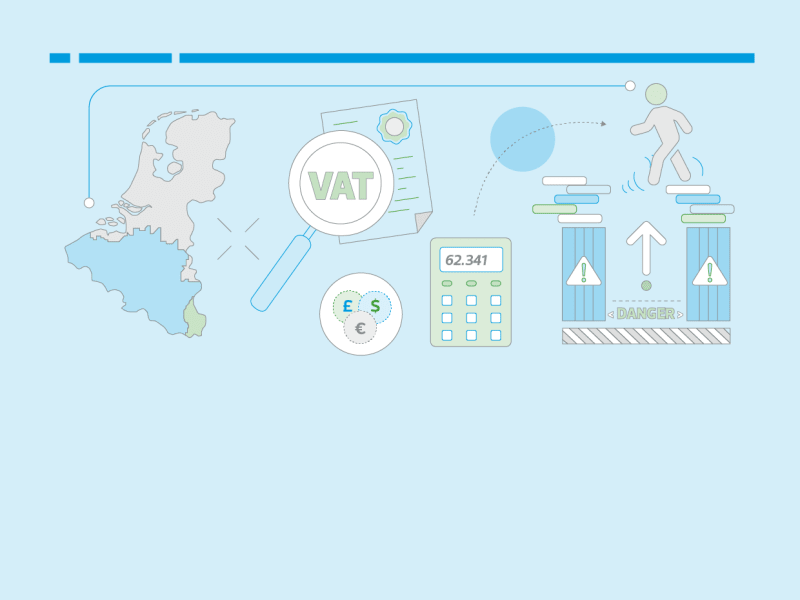Around the world, governments look to raise revenue through ‘indirect taxes,’ such as value added tax (VAT), goods and services tax (GST) and sales and local taxes, with additional taxes imposed on imports via customs and excise duties. The compliance requirements of these taxes can be highly complex and will significantly impact a business’s cash flow.
Value Added Tax (VAT) / Goods and Services Tax (GST)
It is shown on almost every invoice: VAT or GST (hereafter, “VAT”). Even though it accompanies us every day, the system of VAT reporting and input tax deduction, which must function equally in national and cross-border transactions, ties up a remarkable amount of resources in the company. If mistakes are made, VAT can quickly become a margin killer. VAT is an international, transaction-based tax where decisions as to when and whether to charge it and where you might need to be VAT registered have to be made in ‘real-time’
The requirements in the area of VAT are becoming increasingly regulated and bureaucratic and are subject to constant change. In addition, VAT issues are being scrutinised in tax audits at a transactional level e.g. with the help of specialised audit software. Possible tax risks that could leave you financially exposed and penalties should not be underestimated. Tax authorities are increasingly using technology to drive reporting, and improve compliance and businesses need to do likewise
We ensure that you have your domestic and foreign VAT under control. We are primarily concerned with finding strategies for de-risking VAT processes and controls avoiding margin-reducing misjudgements, identifying efficiencies, and implementing them in your company. If necessary, we can quickly and pragmatically clarify issues in an international context with colleagues in the RSM network.
Transfer pricing, indirect taxes and cross-border transactions: What you need to know

Date: 11 September
Time: 09.00 and 16.00 BST
As global supply chains evolve and regulatory landscapes shift, particularly in the wake of Brexit and ongoing trade policy developments, understanding the interaction between these tax regimes in crucial for multinational businesses.
In our webinar, we look at how VAT and similar indirect taxes typically applies to intercompany transactions, highlighting common compliance challenges and the impact of recent case law that could affect the current approach. We then discuss how transfer pricing influences indirect tax and customs valuation costs before reflecting on practical strategies to manage compliance and improve tax outcomes.
- VAT process and operating model reviews
- Support with automating compliance processes and VAT decision-making, including software selection
- Support in e-invoicing requirements including system selection, configuration, and deployment
- VAT compliance services using state-of-the-art technology and processes
- Support related to corporate transactions whether linked to M&A activity or restructuring
- Advisory support including assessment of national and international cases and regulatory and legislative analyses and how they impact businesses
- VAT registrations and deregistration’s domestically and abroad
- Input tax refund procedures and other declaration obligations at home and abroad
- Input tax optimisation for companies with mixed turnover or holding structures (e.g. banks and hospitals) minimising the effect of VAT refund restrictions
- Support, advice and, if necessary, representation during special VAT audits, VAT inspections and in extrajudicial and judicial appeal proceedings
- Extrajudicial and judicial appeal proceedings
- Criminal tax law issues / voluntary disclosures
The scope of certain services provided by each local Member Firm may vary due to local regulations.
Customs, compliance, and strategy
Our range of services matches the area of responsibility of the customs administration and trade professionals and is just as diverse. Our global team of experienced professionals supports you in all matters of customs and related areas, such as:
Customs, foreign trade law, excise and energy tax - the list of legal areas that comprise the term "customs" is long. Preferential law, customs tariff law, customs valuation law as well as export control and dual-use are just a few of the topics that companies that buy, sell or transport goods across borders must consider. Many companies also have to deal with issues from the excise duty area, in connection with e.g. electricity, energy products (primarily mineral oil) or spirits.
The customs authorities are increasingly making the use of simplifications and discounts dependent on whether a company is "compliant", i.e. adheres to legal requirements and has implemented processes that ensure that no or as few mistakes as possible can happen.
Customs duties are a cost factor in global trade that often adds up considerably. At the same time, there are numerous ways to make use of customs programmes and procedures that reduce or completely avoid duties such as concessional tariff rates, use of free trade agreements, drawback schemes and tariff concession orders.
- Trade data analytics and risk review
- Process reviews for identifying potential risks and cost savings
- Assessment of individual facts
- Extrajudicial and judicial appeal procedure advisory
- Audit and examination (customs, foreign trade, excise tax) support
- Representation in applying for authorisations/permissions
- Risk and compliance management/internal control system design, development, and implementation
- Supply chain optimisation Customs and excise tax cost minimisation
- Creation and improvement of internal customs processes
- Customs organisation structuring and alignment
- Acquisitions due diligence and post-merger integration
- Merchandise appraisement and business valuations
- Integrated advisory and guidance among customs, transfer pricing and VAT
- Consultation in connection with software selection for customs, foreign trade, and excise tax processing
- Support in implementing the software as an interface between the specialist and IT department
- Support in implementing the requirements of customs administration on IT with regard to auditability in the context of audits
Whether you're navigating VAT regulations, customs processes, or excise duties, RSM's Global Indirect Tax experts are here to help. With our innovative solutions and expert insights, we'll simplify compliance and optimise your processes to support global middle-market business leaders.




